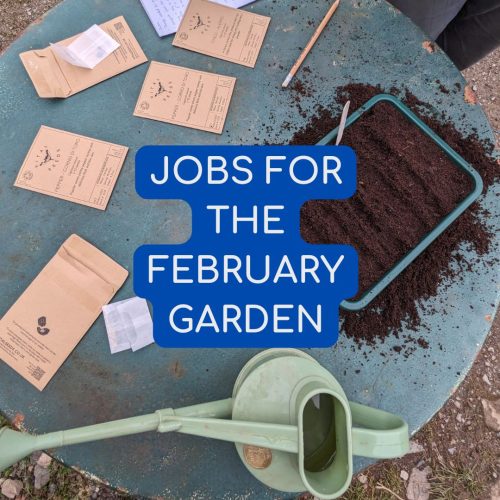After mid February light levels increase and various vegetable crops can be sown if you live in a milder part of the UK. However, even in the South of the UK temperatures can still drop below 0°C, so it is best to sow chard, lettuce, carrots, radish, peas, spinach, cabbages, etc. under cover. Be patient! Warm spells can be followed by freezing weather or flood…
Broad beans are hardy enough to be sown outdoors; they are best sown early so the plants are established before blackfly appears.
It can be a good time to get sowing your tomatoes, peppers, chillies and aubergines. They will need some extra heat and light though to do well. They are very cold sensitive and will grow ‘leggy’ if not provided with heat and light at this time of year. Onions also like a little heat to germinate and can then be grow on under cover until ready for planting.

In a few weeks time your propagation table / bench will be a hubbub of activity as the seed sowing really kicks off for the year. Well done for keeping patient, you will be rewarded with much quicker germination and healthier seedlings for doing so. In the meantime there’s a few things you can do to keep busy.
Overall this month is about getting prepared for the months to come. Making sure your tools are organised, sharp and clean, your compost is ready and your pots, trays and modules are washed and tidy will stand you in good stead.
- Especially when growing an organic garden, planning where your crops go and when is important. Crop rotation helps to reduce a build up of crop-specific pests and diseases, to maintain a good soil structure and to manage fertility of the soil. Planning your garden will make you feel organized, ensure you get a harvest all year round, and get you excited about the season ahead.
- It’s the time of year when you’ll be going through your stored seeds from previous years wondering if they’re still good. Try germination testing them (see our how-to guide here) before replacing and ordering more. Try some new varieties this year. Get inspired in our seed shop here!
- Get your tools and growing materials ready now. Stock up on seed compost (we recommend peat-free growing media), and pots, containers, tools etc. There is an endless amount of used pots, containers, tools, gardening materials in the world, that aren’t in use and often there is no need to buy things new. You can rummage in car boot sales, ask friends, family, neighbors or freecycle.org is a good website where people offer items they do not want anymore. Clean and repair everything so you can get going as soon as the weather permits.
- Beat the winter blues by getting excited about the growing season ahead!